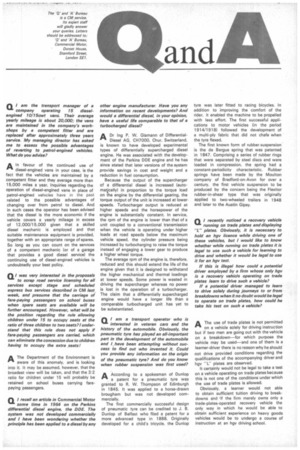n 1 recall an article in Commercial Motor
Page 45

If you've noticed an error in this article please click here to report it so we can fix it.
some time in 1964 an the Perkins differential diesel engine, the DOE. The system was not developed commercially and I have been wondering whether the principle has been applied to a diesel by any other engine manufacturer. Have you any information on recent developments? And would a differential diesel, in your opinion, have a useful life comparable to that of a turbocharged diesel?
ADr Ing P. W. Glamann of Differential
Diesel AG, CH7000, Chur, Switzerland. is known to have developed experimental types of differentially supercharged diesel engine. He was associated with the development of the Perkins DDE engine and he has since stated that later versions of the system provide savings in cost and weight and a reduction in fuel consumption.
Because the output of the supercharger of a differential diesel is increased (automat.ically) in proportion to the torque load on the engine by the differential gearing, the torque output of the unit is increased at lower speeds. Turbocharger output is reduced at higher speeds and the horsepower of the engine is substantially constant. In service, the rpm of the engine is lower than that of a unit coupled to a conventional transmission when the vehicle is operating under higher loads at road speeds below the maximum vehicle speed, the cylinder pressure being increased by turbocharging to raise the torque instead of engaging a lower gear to produce a higher wheel torque.
The average rpm of the engine is, therefore, reduced and this should extend the life of the engine given that it is designed to withstand the higher mechanical and thermal loadings at lower speeds. Some power is wasted in driving the supercharger whereas no power is lost in the operation of a turbocharger. The claim that a differentially supercharged engine would have a longer life than a comparable turbocharged unit has yet to be substantiated.




















































































